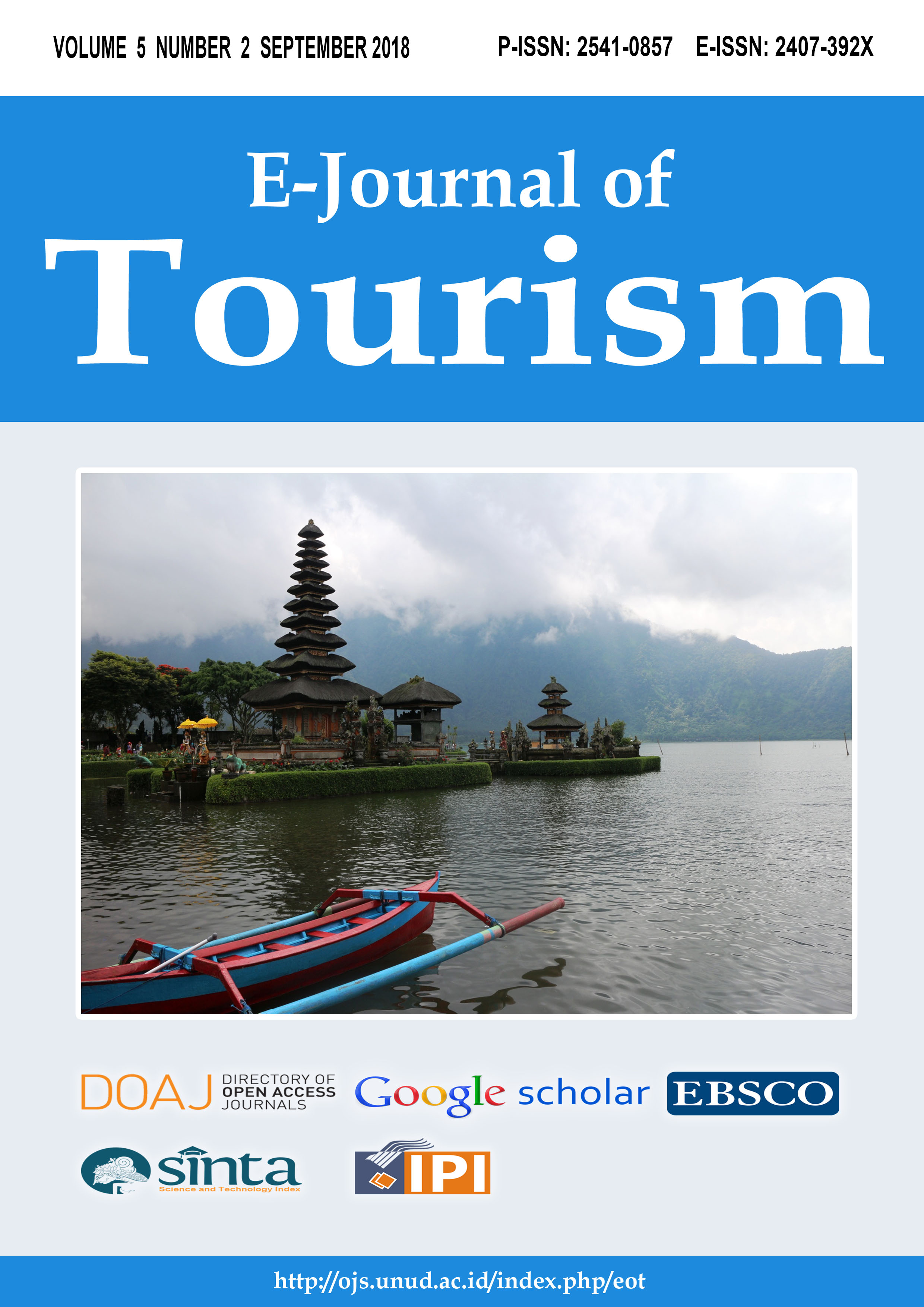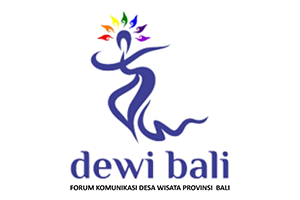Educational Tourism as an Effective Learning Model at Vredeburg Fort Museum Yogyakarta Indonesia
Abstract
The Vredeburg Fort Museum became the main destination of educational tourism. Edu-tourism attractions offered by Vredeburg Fort Museum able to realize educational tourism experience and become a source of learning, not just a source of information. This research is a descriptive survey research. Data were obtained through a survey of 200 respondents selected by purposive sampling and analyzed using three box method. The survey results recorded Vredeburg Fort Museum offers a very varied tourist attraction, with a high index value, which is 150.71, while the learning experience of history science is 145.5. The results is Vredeburg Fort Museum applied cooperative learning concept through the implementation of several elements in the management of educational tourism, including; the team of planners, tourism content, events, local community involvement, tour operators, media, curriculum, teachers, educators, tour flow, and organization. The concept of learning is formed in two spaces, namely classroom and practical experience involving various stakeholders. The concept of learning is very effective to understand the historical messages offered by managers through collectibles, as well as bridges between educational institutions and Vredeburg Fort Museum to get practical training for learners.
Keyword: edu-tourism, learning model, tourism experience, educator, museum
Downloads
References
Amelia, R. and Palupi, S. (2016) ‘The Influence of Services Quality to Domestic Tourists’ Loyalty through Domestic Tourists’ Satisfaction at Mount Bromo Tourism in East Java Indonesia’, E-Journal of Tourism, 3(2), pp. 98–104.
Ankomah, P. K. and Larson, R. T. (2000) ‘Education Tourism : A Strategy to Strategy to Sustainable Tourism Development in Sub-Saharan Africa’, DPMN Bulletin (special issue on Tourism and African Development: Trends and Critical Issues), 7(1), pp. 19–24.
Belyaeva, A. (2007) Integra-modular pedagogical system of vocational education. St. Petersburg: Radom.
Berry, L. L., Carbone, L. P., & Haeckel, S. (2002) ‘Managing the Total Customer Experience’, MIT Sloan Management Review, 43(2), pp. 85–89.
Bhuiyan, M. A. H. et al. (2010) ‘Educational tourism and forest conservation: Diversification for child education’, Procedia-Social and Behavioral Sciences. Elsevier, 7, pp. 19–23.
Black, R. (2000) Ecotourism and Education. Charles Stuard University. AeburgWodonga, NSW.
Bodger, D. (1998) ‘No Title’, Journal of Physical Education, Recreation & Dance, 69(4), pp. 28–31.
Chen, H. and Naquin, S. S. (2008) ‘Competency development, training design, assessment center, and multi-rater assessment’, Advances in Developing Human Resources, 8(2), pp. 265–282.
Cohen, E. (1984) ‘The sociology of tourism: approaches, issues, and findings’, Annual review of sociology. Annual Reviews 4139 El Camino Way, PO Box 10139, Palo Alto, CA 94303-0139, USA, 10(1), pp. 373–392.
Djaali (2008) Likert Scale. Jakarta: Gramedia Pustaka Utama.
Ferdinand, A. (2006) Management ResearchMethods: Research Guidelines for Essay, Thesis, and Dissertationof Management Science. Semarang: Universitas Diponegoro.
Fidgeon, P. R. (2010) ‘Tourism education and curriculum design: A time for consolidation and review?’, Tourism Management, 31(6), pp. 699–723.
Hecht, B., Starosielski, N. & Dara-Abrams, D. (2007) ‘Generating educational tourism narratives from Wikipedia’, in paper presented at the Fall Symposium of the Association for the Advancement of Artificial Intelligence (AAAI).
Hiromi, K. (2009) ‘Current trends in conservation education in Japan’, Biological Conservation, 142, pp. 1950–1957.
Hoffmann, T. (1999) ‘The meanings of competency’, Journal of European Industrial Training, 23(275–285).
Kalinowski, K. M. and Weiler, B. (1992) Review. Educational Travel. In C.M. Hall & B. Weiler (Eds.). New York: John Wiley & Sons, Inc.
Kennes, W. (1997) ‘Developing countries and regional integration’, The Courier ACP-EU, 165, pp. 64–67.
Luh, N. et al. (2014) ‘Destination Management and Imaging Kintamani towards Sustainable Tourism’, 1(2), pp. 83–90.
Malhotra, N. . and Birks, D. (2007) Marketing Research: An Applied Approach, 3rd European Edition. Harlow, UK: Pearson Education.
McGuire, R., Dottavio, F ., & O’Leary, J. (1987) ‘The relationship of early life experience to late life leisure involvement’, Leisure Sciences, 11, pp. 255–260.
McLegan, P. A. (1997) ‘Competencies: the next generation’, Training and Development, 51, pp. 40–47.
Pine Joseph., & J. H. G. (1999) The Experience Economy. United States of America: Harvard Business Press.
Pitman, T., Broomhall, S. and Mcewan, J. (2010) ‘Adult learning in educational tourism’, Australian Journal of Adult Learning, 50(2), p. 20.
Prakapienė, D. and Olberkytė, L. (2013) ‘Using educational tourism in geographical education’, Review of International Geographical Education Online, 3(2).
Procter, L. (2012) ‘What is abour Field Trips? Praxis, Pedagogy and Presence in Virtual Environments’, Social and Behavioral Sciences, 55(980–989).
Rico, M., & Loredana, P. (2009) ‘Higher tourism education in English — Where and why?’, Tourism Review, 64, pp. 48–58.
Riduwan (2009) Measurement Scale of Research Variables. Bandung: Alfabeta.
Ritchie, B.W., Carr, N., & Cooper, N. (2008) School Excursion Tourism and Attraction Management. In.: Fyall A, Garrod B., Leask A., Wanhill S. The Manegement of Visitor Attractions. Oxford: Elsvier.
Ritchie, B. W. (2003) Managing Educational Tourism. Channel View Publications.
Schejbal, C. (2013) ‘Tourism Product Design’, Acta Logistica Moravica, 2, pp. 50–60.
Sekaran, U. (2006) Research method for Business 4th eds. Jakarta: Salemba.
Strain, M. (1998) ‘Towards an economy of lifelong learning: Reconceptualising relations between learning and life’, British Journal of Educational Studies, 46(3), pp. 264–277.
Subhiksu, I. B. K., Ardika, I. W. and Madiun, I. N. (2015) ‘Museums as Cultural Tourism Attractions in Ubud Bali Indonesia’, 6(10), pp. 278–285.
Sugiyono (2012) Qualitative, Quantitative, and R & D Research Methods. Bandung: Mandar Maju.
Towner, J. (1996) An Historical Geography of Recreation and Tourism in the Western World. Chichester: John Wiley.
Umar, H. (2003) Business Research Methods. Jakarta: Gramedia Pustaka Utama.
Urbina, S. (2004) Essentials of Psychological Testing. New Jersey: John Willey & Sons.
Urias, D. and Russo, A. (2009) ‘Ecotourism as an Educational Experience’, AIEA Annual Meeting Presentation, 1, pp. 1–8. doi: 10.1017/CBO9781107415324.004.
Watson, L. (2003) Lifelong learning in Australia. Department of Education, Science & Training.
Wijayanti, A., Janianton. D., Chafid, F., & S. (2018) ‘ANALYSIS OF EDUCATIONAL TOURISM MANAGEMENT AT SMART PARK, YOGYAKARTA, INDONESIA’, Mimbar, 34(1), pp. 1–15.
Wijayanti, A., Damanik, J. and Fandeli, C. (2017) ‘Analysis of Supply and Demand to Enhance Educational Tourism Experience in the Smart Park of Yogyakarta, Indonesia’, Economies. Multidisciplinary Digital Publishing Institute, 5(4), p. 42.
William, P. (2010) ‘Educational tourism: understanding the concept, recognising the value. Tourism Insights’. Available at: http://www.cabdirect.org/abstracts/ 20103311195.html;jsessionid=B879911FD864074D7C5AB7009A83A170.
Wong, A., & Wong, C. K. . (2009) ‘Factors affecting students’ learning and satisfaction on tourism and hospitality course-related field trips’, Journal of Hospitality & Tourism Education, 21(1), pp. 25–35.
WTO (2012) No Title.
Zholobova, V. (2006) ‘Educational tours as a component of the system of forming professional competencies’, Tourism and business, 5, pp. 33–48.

This work is licensed under a Creative Commons Attribution 4.0 International License.
The copyright of the received article shall be assigned to the journal as the publisher of the journal. The intended copyright includes the right to publish the article in various forms (including reprints). The journal maintains the publishing rights to the published articles.




















